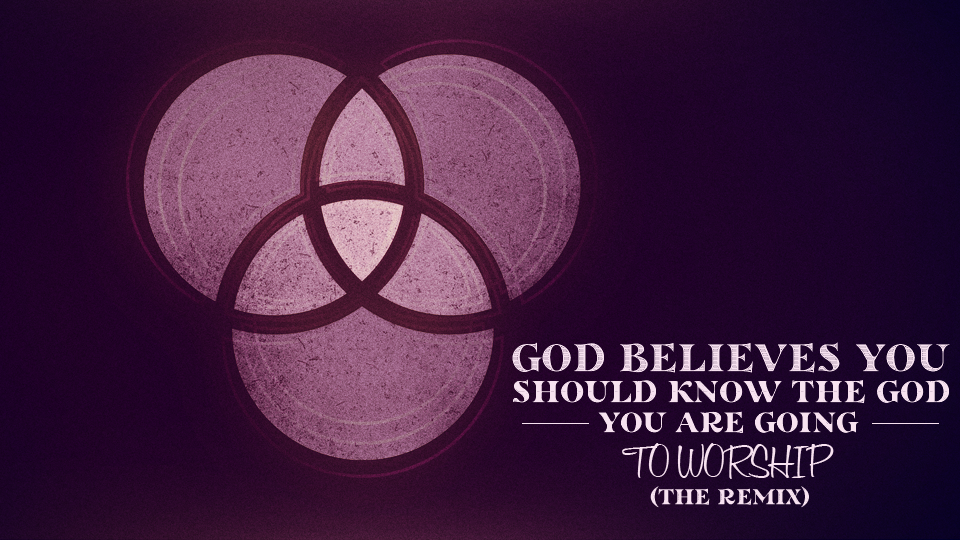God Believes You Should Know the God You are Going to Worship (the Remix)
I want to follow up today on what we talked about on Sunday in worship, and that is: God believes you should know the God you are going to worship.
God knows that part of the free will He gave us would be the option for us to go elsewhere. We have the freedom to reject the message that God gives to us. We have the freedom to allow the enticement of what is around us to bend our hearts to that method of satisfaction. So, God reveals Himself and His will to us, both in big chunks at a time and in subtle ways that unfold the more we reflect on them. It is in these ways that, as we search Scripture, we find the nuanced vision of God in all of His glory. When God asks you to worship Him, it is after an intense, visual, emotional, and intelligent case of His power, glory, and concern for all humanity, crowned with the unexpected move of trading part of Himself so that we might have life after sin. That is the reason that the Trinity matters, because God’s essence is both loving and just, perfectly righteous and perfectly compassionate. This is why God reveals Himself as He does, so you know what your God is going to do for you.
A few thoughts on God’s revelation of Himself:
(1) God chooses to reveal first what is good for us
God’s story unfolds in the message of creation. When sin entered the world and we knew that God was not pleased, God introduced the promise that He would make us good in His sight. Every generation was reminded of all that was good with God and His favor upon those who put their trust in Him.
What happens is that we often forget that God tells us of the good. We forget the promise of everlasting peace, life greater than life, because we get so caught up in the stature of this world. We forget because we like the pity party of being the underdog against an all-powerful God. We must choose to change the lose-lose circumstances that the world wants to place God in to a win-win celebration that righteousness glorifies. And that begins with acknowledging that God will first reveal what is good for us so that we can either receive His benefits or reject His offering.
(2) The Trinitarian nature is not a New Testament idea
From the very beginning, God has revealed Himself in His Trinitarian nature. When Jesus, in Matthew 28, says: Go, therefore, and make disciples of all nations, baptizing them in the name of the Father, and the Son, and the Holy Spirit, Jesus was not establishing some new understanding. Never do the writers of the New Testament argue or imply that Jesus was saying something that offended their sensibilities. So, either Jesus was confirming something that the Jewish people of His time already understood and was articulated by the early church in the Creeds, or He understood the role of the Son and the Holy Spirit as different than what was defined later. For the last 1600 years, the church has continued to affirm that each member of the Trinity is fully God.
(3) The Trinity keeps God in the discussion
All things work for the glory of God. God continues to remind us of this. Yet, few things have the power to generate a discussion like contemplating the vastness and unknowable nature of God. I believe God hides certain things from us so that we will always have the opportunities to pursue more and create deeper discussions. When huge events happen, God is always a part of the discussion, somewhere and somehow. Someone is thinking about God and His role in all of it. Someone is wondering why? Someone is wondering if God is listening. Someone is wondering if God is good. All of these questions come back to the Trinity and how God has revealed, or not revealed, Himself to us. And being in the discussion is good.
(4) We must keep the nature of God connected with His story
Understanding God’s nature is most powerfully seen when we see how He reveals Himself amongst His people. When we limit our view of God, or at least constrict it, to studying the Creeds, we miss how powerfully those revelations are in the lives of His people. Is it more powerful to contemplate the unchangeable nature of God in the context of the universe and His eternal nature, or is it more powerful to think about that unchangeable nature working in your immediate context? Is it more powerful to think of the Holy Spirit creating a “broad” faith, or your faith? God’s revelations are always meant to be seen in light of the story and lives of His people, working for our good, helping at every opportunity, and showing mercy and grace at just the right times.
The Creeds celebrate God’s incomprehensible power; His Word brings Him down to earth (literally).
—————————-
The Trinity matters because it brings to completion God’s plan of redemption and action amongst His people. The Trinity is, at the same time, completely unknowable, yet real and comprehensible because God’s nature follows a plan that can be seen working in our lives every day. Think on these things as you see God at work, each unique aspect of His being, in your life. Amen.




Recent Comments